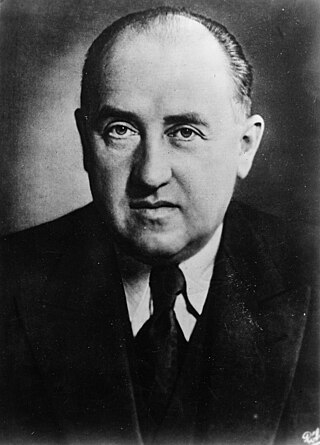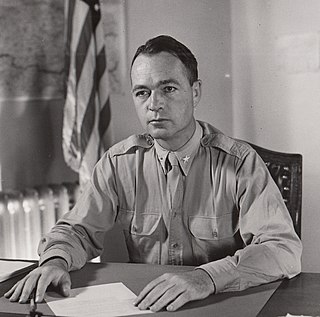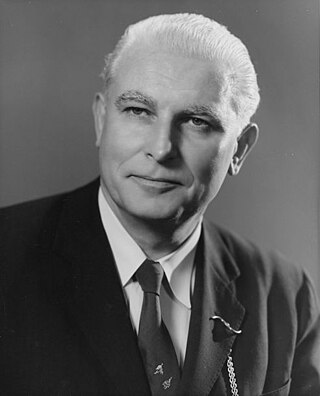
The Nuremberg trials were held by the Allies against representatives of the defeated Nazi Germany for plotting and carrying out invasions of other countries and atrocities against their citizens in World War II.

Robert Houghwout Jackson was an American lawyer, jurist, and politician who served as an associate justice of the U.S. Supreme Court from 1941 until his death in 1954. He had previously served as United States Solicitor General and United States Attorney General, and is the only person to have held all three of those offices. Jackson was also notable for his work as Chief United States Prosecutor at the Nuremberg trials of Nazi war criminals following World War II.

Walther Funk was a German economist and Nazi official who served as Reich Minister for Economic Affairs (1938–1945) and president of Reichsbank (1939–1945). During his incumbency, he oversaw the mobilization of the German economy for rearmament and arrangement of forced labor in concentration camps. After the war he was tried and convicted as a major war criminal by the International Military Tribunal at Nuremberg. Sentenced to life in prison, he remained incarcerated until he was released on health grounds in 1957. He died three years later.

Erhard Milch was a German Generalfeldmarschall who oversaw the development of the German air force (Luftwaffe) as part of the re-armament of Nazi Germany (1933-1945) following World War I (1914-1918). He served as State Secretary in the Reich Ministry of Aviation from May 1933 until June 1944 and as Inspector General of the air force from February 1939 to January 1945. During most of World War II he was in charge of German aircraft production and supply. In the Milch Trial of 1947, a U.S. military court convicted Milch of war crimes and of crimes against humanity, sentencing him to life imprisonment. However, in 1951 John J. McCloy, the U. S. High Commissioner for Germany, commuted Milch's sentence to 15 years. Paroled in 1954, Milch died in 1972.

Telford Taylor was an American lawyer and professor. Taylor was known for his role as lead counsel in the prosecution of war criminals after World War II, his opposition to McCarthyism in the 1950s, and his outspoken criticism of American actions during the Vietnam War.

The subsequent Nuremberg trials were twelve military tribunals for war crimes committed by the leaders of Nazi Germany (1933–1945). The Nuremberg Military Tribunals occurred after the Nuremberg trials, held by the International Military Tribunal, which concluded in October 1946. The subsequent Nuremberg trials were held by U.S. military courts and dealt with the cases of crimes against humanity committed by the business community of Nazi Germany, specifically the crimes of using slave labor and plundering occupied countries, and the war-crime cases of Wehrmacht officers who committed atrocities against Allied prisoners of war, partisans, and guerrillas.

The Milch Trial was the second of the twelve trials for war crimes the U.S. authorities held in their occupation zone in Germany in Nuremberg after the end of World War II. These twelve trials were all held before U.S. military courts, not before the International Military Tribunal, but took place in the same rooms at the Palace of Justice. The twelve U.S. trials are collectively known as the "Subsequent Nuremberg Trials" or, more formally, as the "Trials of War Criminals before the Nuremberg Military Tribunals" (NMT).

Thomas Joseph Dodd was an American attorney and diplomat who served as a United States Senator and Representative from Connecticut. He is the father of U.S. Senator Christopher Dodd and U.S. Ambassador Thomas J. Dodd Jr.

Case Western Reserve University School of Law is one of eight schools at Case Western Reserve University in Cleveland, Ohio. It was one of the first schools accredited by the American Bar Association. It is a member of the Association of American Law Schools (AALS). It was initially named for Franklin Thomas Backus, a justice of the Ohio Supreme Court, whose widow donated $50,000 to found the school in 1892.

Benjamin Berell Ferencz was an American lawyer. He was an investigator of Nazi war crimes after World War II and the chief prosecutor for the United States Army at the Einsatzgruppen trial, one of the 12 subsequent Nuremberg trials held by US authorities at Nuremberg, Germany. When the Einsatzgruppen reports were discovered, Ferencz pushed for a trial based on their evidence. When confronted with a lack of staff and resources, he personally volunteered to serve as the prosecutor.

In the practice of international law, command responsibility is the legal doctrine of hierarchical accountability for war crimes, whereby a commanding officer (military) and a superior officer (civil) is legally responsible for the war crimes and the crimes against humanity committed by his subordinates; thus, a commanding officer always is accountable for the acts of commission and the acts of omission of his soldiers.

Otto Heinrich Kranzbühler was a German naval judge who represented defendant Grand Admiral Karl Dönitz before the International Military Tribunal at the Nuremberg Trials.

Superior orders, also known as the Nuremberg defense or just following orders, is a plea in a court of law that a person, whether a member of the military, law enforcement, or the civilian population, should not be considered guilty of committing actions that were ordered by a superior officer or official.

The following is a bibliography of works devoted to the Nuremberg Trials.

Brenda J. Hollis is an American lawyer. She was appointed by United Nations Secretary-General Ban Ki-moon as Prosecutor of the Special Court for Sierra Leone in February 2010, replacing Stephen Rapp. Hollis was the Chief Prosecutor at the Special Court and served as the lead prosecutor in the trial and appeal of the case against Charles Taylor, the former President of Liberia. Hollis previously served as the Prosecutor of the Residual Special Court for Sierra Leone, which replaced the Special Court in December 2013; currently James Johnson, an adjunct professor at Case Western Reserve University School of Law, serves as the Chief Prosecutor for the Residual Special Court for Sierra Leone. She also serves as the Reserve International Co-Prosecutor for the Extraordinary Chambers in the Courts of Cambodia, and works as a consultant in international criminal law and procedure.
Whitney Robson Harris was an American attorney, and one of the last surviving prosecutors from the Nuremberg Trials.
Edward Francis Lyons Jr. was a World War II veteran who supported the prosecution of German war criminals. He served as an intelligence officer at a prisoner-of-war camp for Germans in Oklahoma before joining the prosecution staff at the Borkum Island trial, a case involving the assault and execution of seven United States airmen.
From 1933 to the end of the Second World War, high-ranking officers of the Armed Forces of Nazi Germany accepted vast bribes in the form of cash, estates, and tax exemptions in exchange for their loyalty to Nazism. Unlike bribery at lower ranks in the Wehrmacht, which was also widespread, these payments were regularised, technically legal, and made with the full knowledge and consent of the leading Nazi figures.
The Central Planning Board was a high level governmental production planning agency set up in Nazi Germany that was active between 1942 and 1945. Its central aim was to make more efficient use of raw materials and manpower in directing the German war economy.














